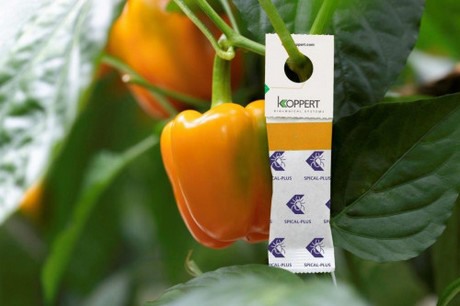Just like most growers, bell pepper grower Rob Moors is now focusing primarily on biological control. Since last year he’s been using biological pest control. "A good choice: my biological control is clearly more effective, so we have been able to further reduce the use of chemicals."
Koppert's biological pest control is supplied by Mertens to the grower. Mertens also supports the grower with strategic advice.
Biological control is a hot issue in contemporary horticulture: the number of available chemical crop protection agents is decreasing rapidly; In addition, there is growing social pressure to bypass chemicals as much as possible. Rob Moors from Asten also notices this. He grows red and yellow peppers on an area of 14 hectares. "Next season another five hectares will be added," says Moors. “We are currently completing the new building; the plants will enter the new greenhouse at the end of November."
In recent years, Moors is increasingly focusing on the biological control of diseases and pests. “Not only because the range of products is further contracting, but also because we are PlanetProof certified. Then as an entrepreneur, you are expected to control in an organic way as much as possible. That is why we use biological pest control, especially against thrips, spider mites and lice. These are together by far the biggest problems in the cultivation of peppers."

Positive test results
Last year, Moors decided to switch to Koppert's biocontrol. He did not do this impulsively, but first - in consultation with Mertens - conducted a test. “Hereby we released Koppert's biological pest control in one department, while in the other departments we opted for the products of our former supplier. I noticed quite quickly that I saw Koppert’s natural enemies better in the crop. And our cultivation staff, who are engaged in scouting, shared that experience. This - together with the fact that delivery times were shorter - made us decide to switch completely to Koppert's biocontrol and to choose for Mertens as a supplier.”
The pepper grower does not regret this decision: the experiences that he gained in the trial last year are confirmed this growing season. "We do indeed see the biological controllers more in the crop, and notice that we can control diseases and pests better."
Steps forward
According to Moors, these positive results are not only thanks to Koppert's biological controllers, but also to the strategic adjustments that he made - from the advice of Mertens’ pepper specialist John van de Pasch. “For example, he advised us to use more parasitic wasps in the fight against lice. This proved to be very effective: we, therefore, had to intervene with less chemicals than in other years. We have also made progress in this regard when countering thrips. Normally we use chemicals immediately after planting to keep thrips under control, but this year we immediately started working with biocontrol. With success. In short: the choice of Mertens contributes to an effective biological control. We have really been able to make steps forward.”
Good sparring partner
In the future, among other things, the control of lice will demand more and more attention, Moors expects. From next year, the insecticide Plenum will no longer be allowed. “And we now use this product a few times a year to combat lice. In order to tackle this problem in the future, we will have to deploy even more biological controllers, and, in particular, preventively. We also need to be more ‘active’ in scouting. Mertens is a good sparring partner in this regard: we continuously consult with John van de Pasch about the right course of action and where to make adjustments. We also walk through the greenhouse together every few weeks. I regard Mertens' knowledge and input as very valuable. And in the meantime, this has already paid off - literally and figuratively.”
For more information: 
Kwekerij Moors
www.kwekerijmoors.nl
[email protected]
Mertens B.V.
+31 (0)77-3999111
[email protected]
www.mertens-groep.nl
